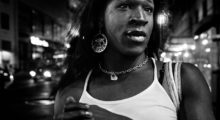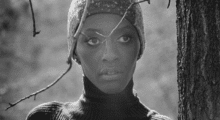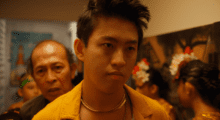Editors
Interviews - Editors
-
“When a Place Is Transformed and Scrubbed, so Are the Original Memories”: Editor Mel Mel Sukekawa-Mooring on The Stroll

In The Stroll, the gentrification of New York City’s Meatpacking District is told through the history of the trans sex workers who long worked and resided in the neighborhood. Through extensive archival materials and intimate interviews, co-directors Kristen Lovell and Zackary Drucker explore how police violence factored into the downfall of “The Stroll” where this community would congregate. Editor Mel Mel Sukekawa-Mooring discusses cutting the film, also touching on the “roundabout journey” that brought them to the industry. See all responses to our annual Sundance editor interviews here. Filmmaker: How and why did you wind up being the editor of your […]
-
“I Never Realized How Gifted He Is With Comic Timing”: Editor Michael Harte on STILL: A Michael J. Fox Movie

The life and career of Michael J. Fox is told through recreations of his most iconic acting roles in STILL: A Michael J. Fox Movie. Editor Michael Harte tells Filmmaker about working on the latest film from Davis Guggenheim. See all responses to our annual Sundance editor interviews here. Filmmaker: How and why did you wind up being the editor of your film? What were the factors and attributes that led to your being hired for this job? Harte: I grew up in the 80s so like a lot of people my age I loved Michael’s movies as a kid. They […]
-
“The World Just Sounded Different 50 Years Ago”: Editors Peter Hagan and Lawrence Klein on Fairyland

Based on Alysia Abbott’s memoir of the same name, Fairyland chronicles Alysia’s (Emilia Jones’s) coming of age in the ’70s and ’80s. After her mother dies, her father moves to San Francisco with the then-5-year-old Alysia and begins openly dating men. The film follows Alysia’s ever-evolving relationship with her father as she relocates to New York for college, travels to France for a study abroad program and eventually returns home to San Francisco. Co-editors Peter Hagan and Lawrence Klein discuss how they worked together to cut Andrew Durham’s debut feature. See all responses to our annual Sundance editor interviews here. Filmmaker: […]
-
“Even the Biggest Fight Scene Was Ultimately About Character”: Editor Robbie Morrison on Polite Society

When Ria’s (Priya Kansara) big sister Lena (Ritu Arya) announces that she’s dropping out of art school and getting married, she immediately knows that something’s not right. As such, the London schoolgirl and aspiring martial artist recruits a couple of friends to save Lena from her own wedding before she moves to Singapore with her new beau. Robbie Morrison tells Filmmaker about cutting Polite Society, writer-director Nida Manzoor’s debut feature. See all responses to our annual Sundance editor interviews here. Filmmaker: How and why did you wind up being the editor of your film? What were the factors and attributes that […]
-
“Develop a Workflow to Effectively ‘Play Ping-pong'”: Editors Roman Liubyi and Mila Zhluktenko on Iron Butterflies

Ukrainian director Roman Liubyi’s Iron Butterflies examines the ramifications of Malaysia Airlines Flight 17, which was shot down by Russian forces as it passed over eastern Ukraine on July 17, 2014, killing all 298 passengers on board. With an intricate nonfiction narrative laid out by Liubyi and Mila Zhluktenko, Iron Butterflies confronts the political aftermath of this atrocity. Liubyi and Zhluktenko discuss the process of cutting Iron Butterflies, as well as their involvement in the Babylon’13 film collective. See all responses to our annual Sundance editor interviews here. Filmmaker: How and why did you wind up being the editor of your […]
-
“The Feeling of Interconnectedness We Share as Humans”: Editor Chris McNabb on Invisible Beauty

The impressive life and career of model and activist Bethann Hardison is the focus of Invisible Beauty, co-directed by Frédéric Tcheng and Hardison herself. From Hardison’s experience as a Black runway model in the ’70s to her vocal advocacy for more diversity in the fashion world in the 2000s, her decades-spanning commitment to fighting racism in the field is front and center in this documentary. Editor Chris McNabb details their experience cutting the film, which included incorporating Hardison’s memoir-writing journey. See all responses to our annual Sundance editor interviews here. Filmmaker: How and why did you wind up being the editor […]
-
“The Role of an Editor Is Similar in Many Ways to a Good Translator”: Editor Simon Price on Bad Behavior

In Bad Behavior, the feature debut from writer-director Alice Englert, Lucy (Jennifer Connelly) travels to a high-profile silent retreat with her guru (Ben Wishaw). During her search for spiritual enlightenment, however, Lucy can’t seem to let go of her self-centeredness. As the title suggest, Lucy can’t seem to stop engaging in bad behavior—and the worst of it is still to come. Editor Simon Price tells Filmmaker about his experience working on the project, including how he came up in the industry. See all responses to our annual Sundance editor interviews here. Filmmaker: How and why did you wind up being […]
-
“Rules Are Perhaps the Most Useful Ally in Creativity”: Editor Meredith Perry on PLAN C

During a period of horrifying restrictions on women’s reproductive rights, Francine Coeytaux’s grassroots organization Plan C is actively fighting back by aiding individuals across the country gain access to vital abortion medication. Documentary filmmaker Tracy Droz Tragos follows the plight of Coeytaux and her allies in the aptly titled PLAN C, which premiered at the 2023 Sundance Film Festival. Editor Meredith Perry tells Filmmaker about how her experience working on PLAN C ultimately solidified her understanding of reproductive justice as a whole, and much more. See all responses to our annual Sundance editor interviews here. Filmmaker: How and why did you […]
-
“Funnier Is Almost Always Better in My Book”: Editor Robert Nassau on Shortcomings

Ben (Justin H. Min) is a movie theater manager and struggling filmmaker whose life is thrown into tumult when his best friend Alice (Sherry Cola) relocates to New York City for an internship. Adapted from Adrian Tomine’s graphic novel of the same name, actor Randall Park makes his directorial debut with Shortcomings, a film about the complexity of Asian-American identity. Editor Robert Nassau talks about his love of Tomine’s original graphic novel, the religious childhood experience of watching Close Encounters of the Third Kind and how each project he works on teaches him something new. See all responses to our […]
-
“Intently Listening to ‘Mmmbop’ on Repeat”: Editor Reynolds Barney on Jamojaya

Writer-director Justin Chon returns to Sundance with Jamojaya, a film about a father-son relationship that’s made fraught by recent losses and financial difficulties. James (Brian Imanuel) is an up-and-coming Indonesian rapper who’s visiting Hawai‘i to cut his debut album, which is set to premiere on a major record label in the US. His travel companion is his dad and former manager (Yayu A.W. Unru), who can see that James is drowning in debt due to this major label acquisition. While he’s still mourning the loss of his other son, James’s father becomes his de facto assistant, micro-managing his every move—and […]
